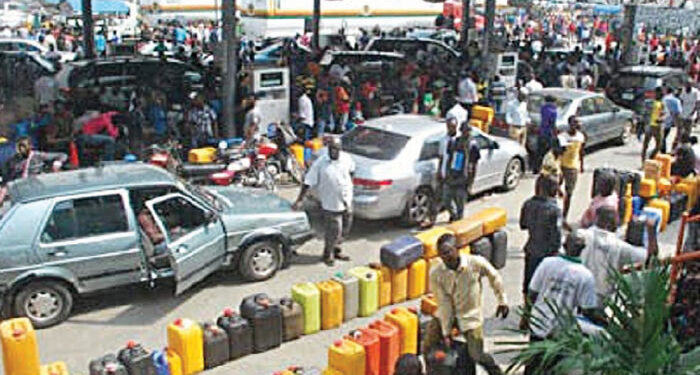The price of Premium Motor Spirit (PMS), commonly known as petrol, could soon surpass N1,000 per litre at filling stations as private depots have increased their rates to between N920 and N950 per litre. This development has sparked concerns about a potential halt in petrol imports by the Nigerian National Petroleum Corporation Limited (NNPCL) due to escalating costs and financial strain.
On Monday, protesters took to the streets of Abuja, demanding the immediate removal of NNPCL’s Group Managing Director, Mele Kyari, citing the ongoing fuel scarcity. The protesters, displaying banners with messages like “No direction under Kyari” and “We want accountability in NNPCL,” criticized Kyari’s leadership, blaming him for the persistent fuel shortages.
NNPCL, the sole importer of petrol into Nigeria, has been subsidizing the product, leading to significant financial pressure on the company. Olufemi Soneye, NNPCL’s spokesperson, confirmed the company’s financial difficulties, emphasizing that the cost of maintaining a stable supply of PMS has become unsustainable.
Independent petrol marketers, who control around 80% of Nigeria’s filling stations, have also expressed concerns. They revealed that NNPCL officials have informed them of the company’s inability to sustain current import levels, hinting at a possible price hike at the pumps in the coming weeks.
The Nigerian Upstream and Downstream Petroleum Regulatory Authority (NMDPRA) has attempted to downplay the situation, arguing that depot prices reported by their officials are lower than those cited by marketers. However, independent marketers have countered this claim, stating that the rising depot prices are a direct result of NNPCL’s inability to supply petrol at a sustainable cost.
As the price of petrol continues to climb, the impact on ordinary Nigerians is becoming increasingly severe. In some states, petrol is already selling for over N1,000 per litre, forcing many to rely on public transportation as private vehicle usage becomes prohibitively expensive.
The ongoing crisis has also led to calls for a full deregulation of the petrol market or the return of fuel subsidies, with many stakeholders arguing that the current partial deregulation is untenable.
Meanwhile, the Trade Union Congress (TUC) and major opposition parties have warned that any further increase in petrol prices could trigger widespread protests across the country. They argue that the government’s handling of the fuel crisis is exacerbating the already dire economic situation, leaving Nigerians with little hope for relief.
The situation remains fluid, with many calling on President Bola Tinubu and NNPCL’s leadership to take decisive action to prevent further escalation of the crisis. As the nation grapples with this challenge, the future of petrol supply and pricing in Nigeria hangs in the balance.
























